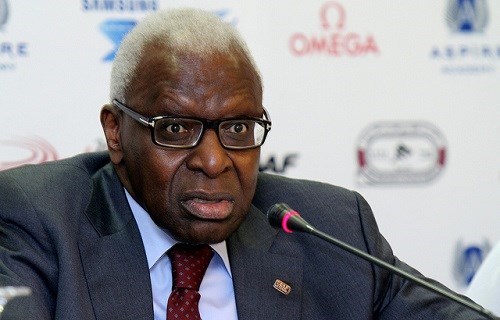Comment
Put international sports federations under administration!

Former IAAF president Lamine Diack is the latest sports leader to come under criminal investigation. Photo: Lamine Diack in 2012 by Vinod Divakaran/Doha Stadium Plus Qatar/Flickr
06.11.2015
The avalanche of compromising revelations in international sports these days begs for someone outside sports to take control over sports administration. Sport governing bodies need emergency help, their leaders have proven helpless in taking care of the governance of their own business.
This week former president of the International Association of Athletics Federations (IAAF) Lamine Diack (82) was arrested on suspicions of covering up doping in Russian athletics alongside the former head of the anti-doping department in IAAF, Dr. Gabriel Dollé and Habib Cissé, a legal adviser to Diack. According to claims made by French police, Lamine Diack has received USD 200,000 from the Russian Association of Athletics Federations for covering up Russian doping tests. The other two are also suspected bribed.
After German TV broadcaster ARD screened the two documentaries “How Russia Creates Champions” and the “Dark side of Athletics” this past year (on doping in Russian and Kenyan sports, respectively) the successor of Lamine Diack, Sebastian Coe angrily called the accusations put forward in these films a ‘declaration of war’ against the world of athletics.
The arrests of former high ranking officials of the IAAF this week ought to severely adjust the IAAF president’s tone of voice. I advise him to act more humble and beg for help from outside the ranks of the IAAF.
What is clear from the past years is that media discovering malpractices of IAAF (and other federations) is not the problem in athletics. The demons inside the organisation is. If Sebastian Coe really wants to combat the rotten culture of his own organisation – although I sometimes find it hard to believe there is truth in his promises – he needs a lot of help from the outside. He is not capable of winning this fight alone and especially not in opposition to the media.
Earlier this week, in Danish newspaper Ekstra Bladet, journalist Jan Jensen and I revealed documentation that FIFA in January 2014 received a series of allegations against Sheik Salman from Bahrain. However, Michael Garcia, former head of the investigatory camber of FIFA’s ethics committee failed to take these accusations seriously.
Sheik Salman was accused of helping to bring Bahraini athletes participating in the Arabic Spring to the torture room. This breach of duty by the leader of the ethics committee is just one of many from FIFA officials and falls in line with the many stories of mismanagement in the rest of the sports world.
In addition to all the arrests we have seen in international football the last year and the unbelievable (?) revelations now popping up from athletics, we have seen new invstigations in Brazil into leaders of the international volleyball federation (FIVB) and more bizarre stories from the desk of Hassan Moustafa, President of the International Handball Federation (IHF).
The sad thing is that this is just tip of the iceberg.
At the Play the Game 2015 conference in Aarhus in late October, the report Sports Governance Observer 2015 was presented for the first time. This is a report on democracy, transparency and governance of the 35 Olympic Sports. It is depressing reading.
Only four federations have a nominations committee in place that performs integrity and professional checks, only 12 federations publishes externally audited annual financial reports on its website and none of the federations publish reports on remuneration, including per diem payments and bonuses, of its board members and senior officials. And these are only a few of the key findings.
Read more about The Sports Governance Observer 2015
Until now whistleblowers, courageous journalists and police authorities have had the guts to reveal what is going on in the dark corridors of sports showing some of the hot shots of sports the door to the Court Room. The sports organisations themselves have so far only been reactive to what the outside world has discovered and not taken any serious preventive actions themselves. And most often when international sports federations are taking measures they focus more on output (what they want to achieve) than outcome (how to achieve results).
The glass is more than full for international sports federations and for supporters of the respective sports all over the world. There is an immediate need for help from the outside. There should be an end to the skin democracy of sports.
Proposals of interim governing of the most troubled federations of sports federations and emergency employment of leaders from outside sports may be met by arguments from many inside the sports organisations that this would be against the democratic processes and formal procedures of the sports bodies. To them we should reply: You have broken these rules yourself already a long time ago.
We need action now!





